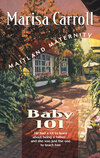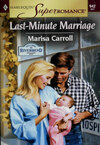Читать книгу: «Family Practice»
Welcome home…
Dr. Callie Layman isn’t looking forward to going home to White Pine Lake, Michigan. She isn’t looking forward to taking over as the physician in charge of the community clinic after only recently becoming a doctor. She isn’t looking forward to facing her new stepmother, stepsiblings or the changes in her relationship with her father. And she certainly isn’t looking forward to going head-to-head with Zach Gibson, the handsome former combat medic who’s been running the clinic and will now be her assistant.
And yet the community needs her expertise. Her family needs her to help them heal. And, she learns, so does Zach. Callie decides she has to try to help them, but ultimately can she be everything they need her to be?
Maybe he was right....
Maybe Callie couldn’t spin all the separate ends of her family ties together into a long, strong yarn that could be woven into a whole. But she had to try.
Zach lifted his hand and touched her lips, just a brush of his fingertip, but it felt as if her skin had been seared by fire. “I know you have to try. I wouldn’t expect anything less of you. You want what’s best for everyone, but sometimes that just doesn’t happen, Callie. And that’s not your fault. Sometimes you can’t make it all come out right.”
Tears blurred her vision. She blinked them away. She didn’t like being this vulnerable. She didn’t like having her innermost hopes and dreams exposed—particularly to a man as perceptive as Zach Gibson.
And she knew what was going to happen next. He was going to kiss her….
Dear Reader,
Marian and I are thrilled to be contributing our story, Family Practice, to the Harlequin Heartwarming line. For many years we’ve wanted to be able to write a book that concentrated on the emotional aspects of falling in love and staying in love and less on the physical side of the equation. Thanks to Marsha Zinberg and her wonderful editorial staff, we’ve been able to do just that.
Callie Layman is a newly minted M.D. She returns to her small northern Michigan hometown—with real misgivings—to care for its colorful inhabitants and to try to blend the disparate elements of her own complicated family situation, including precocious and antagonistic eleven-year-old stepsiblings, a pregnant stepmother and rebuilding the bond between herself and the mother who abandoned her years before. On top of everything else, she finds she’s obligated to share her practice with handsome physician’s assistant Zach Gibson, who, unlike Callie, knows exactly what he wants from his life. And one of those things he knows he wants is Callie.
Will Callie be able to have it all? A career, a love of her own, a happy life in White Pine Lake? Will she be able to weave all these tangled strands of family and romance into a seamless loving whole, or will it all be too much? Will she end up with her happy-ever-after or will Callie turn her back on everything and everyone she cares about rather than risk it all for love?
We hope you enjoy reading Family Practice as much as we enjoyed writing it.
Sincerely,
Marisa Carroll
(Carol Wagner and Marian Franz)
Family Practice

Marisa Carroll

MARISA CARROLL
Marisa Carroll is the pen name of sisters Carol Wagner and Marian Franz. They have been writing bestselling books as a team for more than twenty-five years. During that time they have published more than forty titles, many for the Harlequin Superromance line and Feature and Custom Publishing. They are the recipients of several industry awards, including a Lifetime Achievement Award from RT Book Reviews and a RITA® Award nomination from Romance Writers of America, and their books have been featured on the USA TODAY, Waldenbooks and B. Dalton bestseller lists. The sisters live near each other in northwestern Ohio, surrounded by children, grandchildren, brothers, sisters, aunts, uncles, cousins and old and dear friends.
MILLS & BOON
Before you start reading, why not sign up?
Thank you for downloading this Mills & Boon book. If you want to hear about exclusive discounts, special offers and competitions, sign up to our email newsletter today!
Or simply visit
Mills & Boon emails are completely free to receive and you can unsubscribe at any time via the link in any email we send you.
To Marsha Zinberg
For all your years of excellent editorial advice,
steadfast friendship
and your uncanny ability
to choose the restaurants with the best crème brûlée.
Contents
CHAPTER ONE
CHAPTER TWO
CHAPTER THREE
CHAPTER FOUR
CHAPTER FIVE
CHAPTER SIX
CHAPTER SEVEN
CHAPTER EIGHT
CHAPTER NINE
CHAPTER TEN
CHAPTER ELEVEN
CHAPTER TWELVE
CHAPTER THIRTEEN
CHAPTER FOURTEEN
CHAPTER FIFTEEN
CHAPTER SIXTEEN
CHAPTER SEVENTEEN
EPILOGUE
CHAPTER ONE
CALLIE LAYMAN STEERED her eight-year-old Jeep off the pavement and into a small, scenic turnout. Luckily, it was momentarily devoid of camera-wielding tourists and their bored offspring, and so for a precious few minutes she had the parking lot and the spectacular view of the Sleeping Bear Dunes to herself.
She had a love/hate relationship with this season. Tourism was the mainstay of the economy for this semi-remote region of Michigan’s northern Lower Peninsula; it was also its bane. Tourists came for the unspoiled natural beauty and the opportunity to commune with nature. They stayed, in droves, to complain that their internet connections were too slow, their cell-phone reception was spotty at best and nonexistent at worst, and that the nearest Starbucks was more than an hour away. Through it all, the citizens of White Pine Lake, her hometown, smiled and nodded and kept their opinions on city folks’ strange ways to themselves, as their cash registers jingled and the motel rooms and rental cottages filled up.
The problem for Callie was she felt like one of those city folks these days, one of those barely tolerated outsiders. She’d been gone from White Pine Lake for over a decade, attending college and medical school. She wasn’t ready for what she had agreed to do this summer—assume responsibility for the health and well-being of the citizens of her old hometown. What if she wasn’t up to the challenge? What if she failed them? Luckily, just days before she headed north, she’d gotten another job offer—an escape plan if things here didn’t go well.
She had left Ann Arbor in the early afternoon. It was now a little after eight in the evening. Five hours with only one stop. Not bad travel time on the two-lane state highway. Especially on a late-July weekend when mud-splattered RVs pulling all shapes and sizes of boats and trailers loaded with camping equipment slowed traffic to a crawl.
She was tired and stiff, but she’d managed to arrive a day ahead of schedule. No one expected her until tomorrow, and she was in no hurry to resume her journey. So she unhooked her seat belt and rested her forearms on the steering wheel, soaking in the quiet and the view. Below her the ruffled blue water of White Pine Lake was dotted with fishing boats and the red-and-white sails of small sailboats. The occasional Jet Ski cavorted among them, rooster tails streaked with iridescent rainbows shooting high in their wakes. The sun was just dropping behind the horizon, painting the sky with a dozen shades of red and gold. At the far edge of the lake was the town of the same name, the place where she’d grown up.
She loved this view, especially at this moment in midsummer when the sky was so high and blue, the trees a dozen shades of green, from the darkest pine to the palest silver-green of birch and poplar—“popples,” as they were called this far north—and the last of the warm golden sunlight shining bright and benign on the cottages that dotted the shoreline.
Even from this distance, she could tell that Lake Street was crowded with cars, a good sign in these hard economic times. It appeared as if McGruders’ Bait and Tackle was doing a brisk business in minnows and night crawlers to tempt the lake’s wily perch and walleye onto anglers’ hooks, and Kilroy’s ice-cream parlor had a line at the takeout window. Only three streets deep and half a mile in length, the town where she’d been raised was so small it could be viewed in its entirety from her vantage point.
The year-round businesses were clustered at the intersection of the county highway and Main Street: a hardware store, the grocery and pharmacy, a single gas station, a pizza shop and an auto-repair shop. Across the street, rental cottages and three or four motels turned their back sides to the pavement so their patrons could enjoy the lake views from decks and shaded porches. Further to the north, where the street narrowed and clung to the shoreline, tourists strolled along, window-shopping at the galleries and gift and fudge shops that comprised the “historic” district. A few miles south, toward Traverse City and the Leelanau Peninsula, the land grew more rolling and fertile, home to dozens of boutique wineries and the sweet-cherry orchards the area was world famous for. White Pine Lake tended to cater more to families and retirees, so there were no casinos or tasting rooms to lure the upscale and trendy, and that suited Callie just fine.
She let her attention be drawn to the place she had always loved best in the world, a three-story white clapboard building with a steeply slanted roofline, topped by a glassed-in widow’s walk with an oxidized copper roof. The White Pine Lake Bar and Grill had been sitting foursquare and solid on that slight rise above Lake Street since the 1930s. It was the business that had sustained her family for three generations, and it was her childhood home.
She couldn’t quite make out the details from this distance, but the memory was clear in her mind. Six double-hung windows guarded by faded green shutters were spaced across the second floor, above the long, covered porch. Stone steps, bordered by flowerbeds filled with cascading petunias, daisies and lush green ferns, led from the sidewalk to the wide porch set with small tables and chairs. The building’s tall double doors always stood open whenever the weather permitted, as it did today. The wood-framed screen doors that kept the mosquitoes away banged shut behind customers with a satisfying snap when they stepped into the native white-pine foyer that separated the family-oriented dining room from the bar.
Callie had always been fascinated by the history of the place, too. Over a hundred years old now, the building, once a railway hotel, had been moved to its current lakeside location by teams of huge draft horses. The black-and-white photos taken by her grandfather Layman in his youth chronicled the fifteen-mile journey and still hung in the taproom. When her father was a child, the town’s historical society had published a little booklet documenting the move and sold it for three dollars a copy. For as long as she could remember, the booklets had been kept in a stack by the cash register.
She wondered if they were still there or if they had been moved or just plain done away with. There was no telling what kind of changes Ginger Markwood Layman had made to the place since Callie’s last visit at Christmas. She wouldn’t be a bit surprised if nothing was the same as it had been. Her dad certainly wasn’t.
Callie straightened and refastened her seat belt, ashamed of her lapse into uncharacteristic spitefulness. J. R. Layman was exactly the man he’d always been: honest, hardworking, thoughtful and soft-spoken. What was different about him was that at forty-nine years of age, the staid, upstanding, fifteen years-divorced CPA had fallen head over heels in love with a woman a dozen years younger than he was, gotten her pregnant and married her.
Consequently at twenty-nine Callie was going to be a big sister. Well, technically, she already was a big sister, she amended as she shifted out of Park and checked her side mirror for traffic coming up behind her on the narrow, curving road. Her new stepmother had two children by her first marriage—eleven-year-old twins, a boy and a girl, Becca and Brandon. At least they were fraternal twins, so she didn’t have any trouble telling them apart, but she was very much afraid she would have trouble relating to them once she was home permanently.
Their first meeting had been during her last visit at Christmas. It hadn’t been a roaring success. The gifts she’d chosen for the twins hadn’t suited their interests and had only been grudgingly acknowledged, and the awkwardness of all of them being thrown together, virtual strangers to each other at the most family-oriented time of the year, had made the visit even more painful.
Still, she had to get used to being around preteens and babies. Not only because she had stepsiblings and a new half brother or sister on the way, but because in less than forty-eight hours she would begin practice at White Pine Lake Community Health Center, and that meant treating everyone, young and old, who walked through its doors. Whether she felt ready for the challenge or not.
And Callie truly had no idea what she was walking into. Gail Wilberforce, the fiftysomething veteran certified nurse practitioner at the clinic, had up and eloped with a golf pro and moved with him to North Carolina. So a physician’s assistant she’d never met was staffing the clinic—one Zach Gibson, former navy combat medic.
Her dad said Zach was one heck of a nice guy, but the practice required more than just one PA. They needed a doctor—they needed Callie.
Since Callie had the summer off—her first ever, she thought with a pang—and since the clinic was dedicated to her grandparents, who had worked for years to see it built and staffed, and since her dad was now the president of the Physician’s Committee, she couldn’t say no. Even though it was the last place in the world she wanted to start her professional life.
But she was a Layman. There had been Laymans in White Pine Lake for a hundred years, and all of them had done whatever they could for the town. So here she was, a freshly minted M.D. with no real-world experience to speak of, about to step into the most frightening situation she could imagine—being responsible for the health and well-being of people she’d known all her life on top of being thrust into partnership with a man the whole town considered a bona fide war hero.
Describing Zachary Gibson as battle hardened wasn’t a cliché. It was the plain, unvarnished truth. After two tours of duty in Afghanistan and an honorable discharge from the military, he’d moved to Petoskey and begun working with one of the staff surgeons at the hospital there. He had military decorations and commendations and a 4.0 grade-point average during his medical training, as well as glowing recommendations from his boss, a hotshot neurosurgeon.
Her dad had told her all of this, proudly believing such a résumé would sweeten the deal for Callie to take over as the clinic’s doctor. Unfortunately, it only added to her insecurity. On paper, at least, she was the physician in charge, the boss, but deep down inside where it really mattered she wasn’t so sure of herself. She was the rookie, the one with no street smarts and little small-town-practice experience. She was afraid it wouldn’t take long for her combat-tested PA to figure out he was the one really running the show.
* * *
ZACH GIBSON WONDERED what the hell else could go wrong today. It was Saturday. He was supposed to be out on the lake in the small aluminum boat that came with the tiny, amenity-scarce cottage he rented, watching the sunset, swatting mosquitoes, hoping to latch onto a keeper walleye or a couple of nice bluegill and perch to fry up for his dinner. Fishing usually put him in a great mood, let him concentrate on his thoughts, and this afternoon’s outing was supposed to have given him a chance to make a game plan for Monday morning. Should he show up for work in khakis and a nice shirt to impress the new boss, or stay with his usual T-shirt and fatigues beneath his white coat, silently making a stand for doing his own thing right from the start?
Instead he was ankle-deep in water in the middle of the clinic lab, wielding the hose of an industrial vacuum cleaner in hopes of keeping the floor tiles from buckling, ready to duck and cover if the ceiling caved in. From the size of the increasing bulge in the tiles above his head, his buddy Rudy Koslowski hadn’t yet found the leak in the sprinkler system that had caused the damage in the first place and shut it down.
So much for making a gonzo first impression on the new M.D. He’d be lucky now if they could even open the clinic for regular hours Monday morning. Mercifully the plastic cover they used to keep dust off the X-ray machine had saved it, but the computer system was gone and all the supplies in the lower cupboards were waterlogged and probably ruined. They would have lost all the temperature-sensitive medications and vaccines stored in the ten-year-old fridge as well if he hadn’t decided to come check on a few things before he went fishing. And he didn’t even want to think about what kind of mess they’d be in if the water had gotten high enough to reach the shelves of patient records stored in the room next to where he was standing. Thankfully, only the oldest records, the ones waiting to be purged and shredded, had gotten wet, and then only the plastic containers that they’d been stored in. Still, the containers would have to be checked to make sure there weren’t any cracks in the plastic or partially opened lids that had let water get inside.
Any plans he had of spending the rest of the weekend fishing sank like a stone tossed into the waters of White Pine Lake.
When he’d come in and discovered the flooding, he’d shut off the electricity and the propane supply and called Rudy. That was four hours ago. He’d been on damage control ever since.
Cold water began dripping on his head. He flipped the switch on the shop vac and took a prudent step to one side, wondering how much the exam rooms would have to be dried out. The emergency shutoff system seemed to have done its job in that part of the L-shaped building, and hopefully Burt Abrahms from the hardware store would show up soon with some extra extension cords and a couple big fans to hurry along the process. If the ceiling didn’t collapse first.
“Rudy,” he yelled. “Why the heck isn’t the water off? The ceiling’s ready to cave in. It’s looking like the last few minutes of the Titanic in here.”
“Good heavens,” a shocked female voice responded—not his handyman’s. “What happened?”
Zach didn’t make the mistake of thinking she was a tourist who had wandered inside. Though they’d never been introduced, he’d noticed her picture on the wall in the White Pine Lake Bar and Grill, and most recently on the front page of the White Pine Lake Flag in an article announcing her graduation from the University of Michigan Medical School.
Dr. Callie Layman, M.D., wasn’t supposed to arrive in town until tomorrow. But here she was.
He’d been wondering what else could go wrong. Now he had his answer.
“Broken water line in the sprinkler system, ma’am,” he said, eight years of military protocol kicking in. “Situation’s under control.”
She raised one hand to shield her eyes from the glare of the harsh emergency lighting and gave him a skeptical look. “It doesn’t appear to be under control at all, as far as I can see.”
Something in her cool, detached tone and her equally cool, detached appearance—despite the fact that she had apparently just driven over three hundred miles in hot July weather—rankled, but Zach stopped himself from snapping his reply. “We’ll be open for business by Monday morning. I give you my word, Dr. Layman.”
She gave him another sharp glance. “Have we met?”
“No,” he admitted. No reason to be churlish. He held out his hand after wiping it dry on his shorts. “I’m Zach Gibson, your PA. Welcome back to White Pine Lake.”
She wasn’t as tall as he was, but she wasn’t a short woman, either. He guessed about five foot seven or eight, maybe a hundred and thirty pounds. Her mouth was thinner than he preferred on a woman, but a rounded chin and a nose that could only be called “pert” softened the overall contours of her face, framed by cinnamon-brown hair. Her eyes were hazel, big and fringed with long, gold-tipped lashes, and saved her from being plain. She wasn’t drop-dead gorgeous. Many wouldn’t even call her pretty, but for some reason he’d found her face interesting in photographs—at least in the rare ones where she’d been smiling—and now, in person, he found her even more appealing.
“Thank you,” she said. Her tone was dubious, and frankly he couldn’t blame her, considering the condition of her future workplace. “How do you plan to clean up this mess?”
“My buddy’s got a construction business. He’s here hunting down the source of the leak and hopefully shutting it down.”
“Only the two of you? You need to get more people in here.”
Zach didn’t let the judgmental remark goad him into a retort. “I called your father. He’s rounding up some volunteers.” She had grown up in this town. Surely she realized people would pitch in to help once word went out? Or had she been living in the rarified world of a Big Ten medical school so long she’d forgotten her roots?
She might have blushed but he couldn’t be sure with the lousy lighting. “Of course they’ll come.”
Though she didn’t offer to pitch in and grab a mop herself. Great, was she going to be one of those kinds of doctors, the ones with the God complexes and the egos to go with it?
“We weren’t expecting you until tomorrow,” he said as the ominous sound of dripping water filled the silence between them.
“I left Ann Arbor a day early.” She peered around at the boxes of rescued lab supplies and disintegrating cartons of exam gloves, the empty, wide-open refrigerator with the remains of a collapsed ceiling tile still piled on top, balanced precariously on the carcass of the shorted-out police scanner. A frown drew her arched brows together. “Do you have an assessment of the damages?” She didn’t bother to make eye contact this time, just clipped out the question. “Will we be able to see patients on schedule Monday morning?”
Great, she was going to be one of those ramrod-and-ruin kinds. It was going to be a long summer. But two could play at her game. “We lost the computer system and the police scanner, ma’am. That’s the worst so far. I don’t believe there’s any structural damage to the building.”
“But the mess.” She made a little sweeping gesture with her right hand. “There’s water everywhere—”
“Incoming,” Rudy yelled from the doorway. Zach reached out and wrapped his fingers around Callie’s wrist, hauling her forward and almost into his arms as three overhead tiles crashed to the floor, splattering Zach and Callie with water and soggy, cardboardlike shrapnel.
He was wearing old cargo shorts and an even older T-shirt, and he was already wet through, but his new boss hadn’t been expecting a dousing. She let out a shocked gasp as the cold water cascaded down her back and soaked her to the skin.
* * *
“SORRY ABOUT THAT, Doc.”
Callie shifted her attention to the man in the doorway, a short, ruddy-faced, stocky guy with a buzz cut not doing anything to hide his receding hairline, and laughing blue eyes. He was wearing a faded red T-shirt emblazoned with U*S*M*C in equally faded gold letters, and shorts that exposed the prosthesis that replaced his left leg below the knee. His leather tool belt hung low on his hips, as if he were an old-time gunslinger. Rudy Koslowski. She remembered him from high school, even though he’d been a couple of years ahead of her. He’d joined the Marines immediately after graduation and lost his leg in a suicide-bomb attack in Afghanistan.
“Hi, Rudy,” she said, swallowing a sharp comment about the inadequacy of his warning. Rudy had always been a gossip even as a kid. She doubted he’d changed much over the years, and the last thing she wanted was to be reported to all and sundry as a bitch her first day on the job. “Quite a welcome home you arranged for me.”
“We aim to please. You still got the moves, Doc,” he said next.
“I beg your pardon?” But Rudy wasn’t looking at her; he was grinning at the man beside her.
“Oops.” Rudy chuckled, his expression as mischievous as Callie remembered from high school. “Guess we’re going to have to figure out another nickname for you, Corpsman. Can’t have two Docs in the place, can we?” He paused as if waiting for his barb to strike home.
Rudy was smiling, but Zach wasn’t. “Stow it, Rudy. She outranks us.”
“Sure thing.” Rudy raised both hands, signaling surrender, but his grin grew a little wider as he stared pointedly at their joined hands. “Whatever you say.” Belatedly Callie tugged herself free of Zach’s grasp. Why hadn’t she noticed Zach was still holding her hand before Rudy did? Maybe because she had enjoyed the feel of Zach’s long, strong fingers wrapped around her wrist. He had big hands, but his hold on her had been gentle. He would have no trouble setting a bone or reducing a dislocation with those hands and that strength, even in a combat situation. Experience she certainly didn’t have.
“Zach’s patients may call him whatever they and he are comfortable with,” she said, appalled at how condescending the remark sounded. She hadn’t meant it that way. She avoided speaking to colleagues in that manner, although she’d been talked down to plenty of times herself. Medicine, for the most part, was still a man’s world.
“Sure thing, Dr. Layman,” Rudy said. He wasn’t smiling anymore.
“What can I do to help?” she asked, hoping to make some kind of amends. This was not how she’d wanted to start her relationship with Zach Gibson, especially not with a witness as talkative as Rudy.
“Nothing, ma’am.”
She wished he wouldn’t call her that, but she could hardly ask him to call her Callie so soon, and insisting on being addressed as Dr. Layman would only add insult to injury at this point. “I want to help,” she said. “It’s my practice now,” she couldn’t stop herself from adding.
Zach’s face hardened momentarily. “You don’t know where a bloody thing is yet, or where it goes.” His tone softened, probably when he remembered he was talking to his boss. “You’re soaking wet and covered with fiberglass. Go on over to the White Pine and get changed. Besides, Leola and Bonnie are on their way to lend a hand.” The two women, both of whom Callie knew from her childhood, were the clinic’s nurses and receptionist/bookkeepers, both essential to the efficient functioning of the practice. “Everything’s under control here, ma’am.”
“I wish you wouldn’t call me that,” she snapped before she could censure her words.
“Yes, ma’am.” A corner of his mouth ticked up in what might have been a grin, but it was so fleeting Callie couldn’t be sure. “Go, Dr. Layman,” he said, the words just shy of being an outright command. “Let your dad and your new stepmother know you’re in town. Get yourself settled in and we’ll have this place ready for business on Monday morning.”
So this was the way he wanted things to go. Where he continued to call the shots and she had no say in the decisions.
Zach Gibson didn’t want her here; that was easy enough to figure out. The problem was...he was right. She would be more of a hindrance than a help to these people, who were used to working together as a team. She was the outsider. And the one thing she could never let any of them guess, especially her new PA, was that she was afraid she would never fit in.
Бесплатный фрагмент закончился.
























